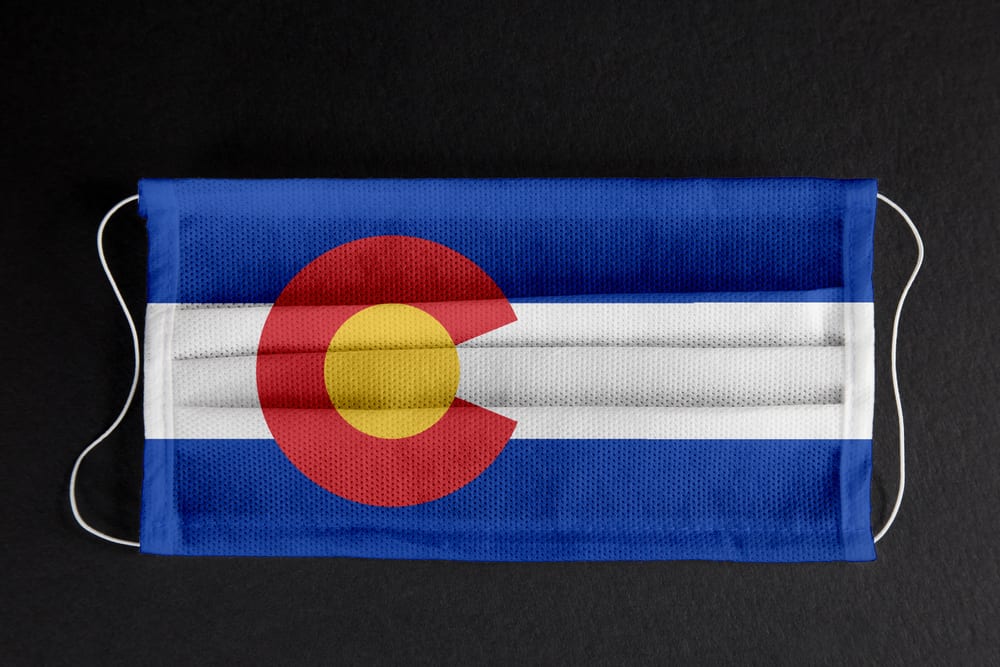Gov. Jared Polis today announced an executive order giving businesses statewide the right to refuse service to anyone not wearing a mask.
“This protects our individual rights and our rights of businesses to deny service,” Polis said, “because our businesses — the people that work there, the other patrons — they should have a right to be protected from those who refuse to take the commonsense step of wearing a mask.
“With this executive order, it’s fine for businesses across our state to say ‘No shirt, no shoes, no mask, no service,’” he added.
The order takes effect immediately.
“Masks are our passport to the Colorado that we love,” Polis said. “If we want to reopen our economy completely, masks are absolutely essential.
“Let’s be smart — let’s wear masks. Let’s be strong — let’s wear masks,” he said. “Let’s stop putting ourselves and others at increased risk, and let’s stop prolonging this crisis for everyone just because you don’t think [wearing a mask] is cool. That’s not cool.”
– Advertisement –
Colorado had 27,060 reported cases of COVID-19 as of June 3, the Colorado Department of Public Health and Environment reported today. Cases have been reported in 60 counties — all but four of those in the state.
Statewide, 4,443 people have been hospitalized. There have been 1,255 deaths due to COVID-19 and 1,512 deaths among people who had COVID-19 but whose deaths were attributed to other causes.
In El Paso County, 1,812 cases have been reported, and 96 people have died. Those figures from El Paso County Public Health are as of today.
Polis also announced today the availability of $44 million in grants through the CARES Act to address the disproportionate impact of COVID-19 on high-needs students.
Grants will be available to preschool through college educational institutions.
“These funds will be deployed where they’re needed the most, to address the impact of COVID-19 by transforming schools and education, improving transitions between P-12 and higher education, and improving student-centered learning,” Polis said.
“We’re going to give priority to schools or institutions that serve a high-needs population and those that are most impacted from a health perspective, economically and socially, by COVID-19,” he said.
Information about applying for these grants through the Governor’s Emergency Education Relief Fund will be released within the next few weeks.
Polis announced June 3 that certain child care providers in Colorado may return to regular group sizes and licensed capacity as stated in Colorado child care licensing rules, beginning June 4.
This guidance is applicable to child care centers, family child care homes and building-based school-age child care programs. It does not include school-age day camps, license-exempt youth programs, or children’s resident camps.
School-age day camps and license-exempt youth programs are currently allowed to operate with smaller ratios as outlined in guidance from CDPHE. Resident camps are still not allowed to operate. Further guidance on children’s resident camps will be released mid-June.
Child care providers must still adhere to other health and safety guidelines as outlined by CDPHE. This includes maintaining physical distancing of six feet whenever possible.
Standard child care licensing rules do allow for approximately this level of physical distancing, as facilities must have 35 square feet per child for infants and 30 square feet per child for preschool and school-age children.
Providers are also encouraged to engage children in outdoor play as much as possible, as this is a safer way for children to interact while still maintaining physical distancing. More information about current guidelines in child care facilities can be found on CDPHE’s COVID-19 website.
For individual assistance with questions, contact Colorado Child Care Licensing at 303-866-5948 or 800-799-5876.
The Colorado Springs Community Development Division is accepting applications for its special CARES Act allocation of Community Development Block Grant (CDBG-CV) and Public Services and Emergency Solutions Grant (ESG-CV) funds. The division anticipates making approximately $1.4 million in federal funds available for eligible projects that specifically prevent, prepare for and respond to the coronavirus and its impacts within the city of Colorado Springs.
All Colorado Springs nonprofits, faith-based organizations, and public agencies that serve low-income Colorado Springs residents are invited to apply.
The minimum request amount for both CDBG-CV and ESG-CV applications is $50,000. Application deadline is 11:59 a.m. June 26.
A total of $1 million in public services grants is available for projects in the areas of housing, whole family health and safety, and resilience. Funds will target programs to help households that make less than 60 percent of area median income and have experienced a loss or reduction of income due to the coronavirus.
Funds totaling $400,000 are available for homeless service programs including emergency shelter, street outreach, rapid rehousing, homelessness prevention and homeless management information systems.
All proposed projects must be tied to a demonstrable increase or modification of services due to the prevention of, preparation for and response to the coronavirus and its impacts on agency clientele.
Technical assistance and updates will be available throughout the application period on the city’s website. Check coloradosprings.gov/community-development for updates.
The application portal is here.
For questions about the application, workshops or program eligibility, contact Naomi Clark at 719-385-6609 or naomi.clark@coloradosprings.gov.
Mountain Metropolitan Transit has made some changes in route service to alleviate overcrowding on some bus routes.
The transit company has temporarily suspended service on routes 18 and 38, which are experiencing very low ridership. Buses and drivers from those routes will be transferred to overcrowded routes.
Route 18 provided service from Union Boulevard to Montebello Square. Route 38 served the area from Montebello Square to Memorial North and Children’s Hospital.
Route 38 is a demonstration project partially funded by the Colorado Springs Health Foundation, Children’s Hospital Colorado and UC Health Memorial Hospital North. Low ridership due to the pandemic is undermining the purpose of the demonstration project. All parties involved have agreed to a temporary suspension of the route.
No changes have been made to ADA Paratransit service.
The U.S. Senate on June 3 passed the RESTART Act, a bipartisan measure that would create a new loan program extending funding to businesses hit hard by the COVID-19 pandemic. The House previously passed the measure.
According to sponsor Sen. Michael Bennet, the bill enhances the Paycheck Protection Program and makes loan forgiveness more flexible.
It “would provide a much-needed lifeline to the hardest-hit businesses, like restaurants, hotels and motels, theaters and concert venues, and gyms,” Bennet said.
The act would extend the eight-week coverage period of the PPP to allow businesses that have seen their revenue decline by at least 25 percent additional time to deploy PPP funds and meet requirements for loan forgiveness.
The new loan program provides funding to cover six months of payroll, benefits and operating expenses for qualified businesses. A share of the loans would be forgiven based on revenue losses suffered in 2020.
Businesses including most nonprofits, veterans’ organizations, self-employed individuals, independent contractors and tribal business concerns with fewer than 5,000 full-time employees are eligible.
Businesses with fewer than 500 full-time equivalent employees will receive more generous loan forgiveness, and the structure of the program is designed to reach the smallest businesses.
A summary of the bill is here.
This content was originally published here.





